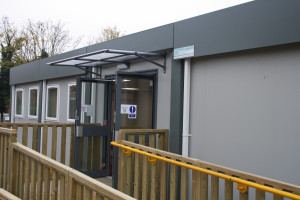
With growing sustainability concerns, sectors ranging from education to manufacturing are all looking to improve their environmental impact. Modular buildings have proven to be a significant step in the right direction, whether they are providing temporary or permanent spacing solutions. The carbon footprint for constructing one building using traditional construction is 56 tonnes. This means that constructing just one building emits the same amount of carbon dioxide as almost five UK residents. Modular buildings emit up to 45% less carbon than traditional buildings.
THE RISE OF MODULAR BUILDINGS
When the COVID-19 lockdown first hit, modular buildings were thrust to the forefront of everyone’s view for quickly and affordably providing emergency medical facilities worldwide. This helped the industry receive universal acclaim and highlighted modular construction as the solution we didn’t know we needed. The sudden exposure of modular buildings has resulted in technological advancements and developments in the modular construction industry. Modular buildings are increasing in popularity, not only due to being time-efficient and cost-effective but also because they are leading the way in sustainable construction. The modular building industry plays a key role in reducing the construction industry's massive material usage and carbon footprint.
HOW IS VOLUMETRIC MANUFACTURING MORE SUSTAINABLE?
Volumetric construction is the process of manufacturing in a dedicated factory setting. This method is incredibly streamlined and efficient. Around 70% of modular construction occurs in a factory to produce units called modules. Factory construction means that quality control levels, which aren’t possible on a traditional building site due to weather, are adhered to. All modules are pre-planned before manufacturing, meaning that exact amounts of materials are used, reducing waste to landfills. Any excess materials that are produced are either reused, recycled or repurposed.On average, 67% less energy is required to produce a modular building.
REDUCE EMISSIONS WITH MINIMAL TRANSPORTATION
Volumetric manufacturing also reduces the number of vehicles required for transportation. Unlike traditional construction, modular construction doesn’t require vehicles such as cement mixers, bulldozers, cranes, compactors and trenches, to name a few. These vehicles pump a large volume of CO2 into the air on-site and when travelling to and from the site. Modular buildings are simply transported to your site, ready for installation by our specialist team. Therefore, the number of vehicles required is significantly reduced. Reducing the number of vehicles required lowers carbon emissions and traffic congestion related to your project, resulting in faster, greener, more affordable construction.
QUICK INSTALLATION FOR A GREENER PROJECT
The longer the construction time, the more significant the negative environmental impact. Modular buildings minimise construction time with quick installation. Studies demonstrate a 30% and 60% reduction in lead time compared to traditional construction. Reduced installation time reduces the time you have to wait for a fully functional building and reduces noise, which can disrupt local wildlife. Damage to grass and other greenery is also lessened.
ARE MODULAR BUILDINGS ENERGY EFFICIENT?
Modular buildings are energy efficient from their inception. The production of a modular building is incredibly eco-friendly due to factory construction, which allows for easy energy control. Modern design standards and technology also mean modular buildings are energy efficient throughout their lifespan, saving you money on more than just your construction bill. Modular buildings are airtight, with double-glazed windows, high-quality insulation and advanced sealing techniques to prevent thermal leakage. This reduces energy spent heating the building and makes modular buildings a long-term, environmentally friendly solution. Modular buildings can also be fitted with solar panels on the roof, smart heating systems, and even LED lights with motion sensors to further their sustainability.
IS MODULAR BUILDING AS AFFORDABLE AS IT IS SUSTAINABLE?
We often think that if something is built to be environmentally friendly, it must be more expensive. This is not the case for modular buildings. The sustainable, energy-efficient manufacturing of modular buildings reduces their cost. Using a factory means production doesn’t experience delays due to poor weather or material delivery. Everything needed is readily available and completed to a set schedule. These efficiency factors cut down on needless waste and uncertainties, which cost time and money in the construction industry.
SECTORS CHOOSING SUSTAINABILITY
Modular construction is the next big step in sustainable building in the UK. Sectors which are already using modular buildings include: Education: Modular classrooms are becoming increasingly popular due to being time-efficient, cost-effective and environmentally friendly. Teaching children about sustainability is vital to protect the environment for future generations. Choosing modular classrooms aligns an establishment’s actions with the values they are imparting to their students. Corporate: Many businesses are becoming more concerned with sustainability, and rightly so. 77% of consumers would prefer to shop from a brand which has adopted positive environmental practices, so becoming more eco-conscious is vital for businesses to maintain a customer base. Modular office buildings are an excellent spacing solution and a step toward sustainability.
CHOOSE SUSTAINABLE CONSTRUCTION
Paragon Space is a modular building manufacturer based in Hull. We provide sustainable modular building solutions to businesses across the UK. At Paragon Space, we regularly optimise how our modular buildings are built to create a more environmentally friendly process. We also work closely with our clients to develop affordable energy solutions to fit their requirements.If you want to learn more about our modular buildings' sustainability, contact our friendly team today.


We are sure that our modular buildings will elevate your schools to success. Speak to our friendly team to get your project off the ground.



© Copyright 2025, All Rights Reserved Paragon Space
Website and Marketing by Eyeweb